非谓语动词总结
- 格式:doc
- 大小:261.00 KB
- 文档页数:25
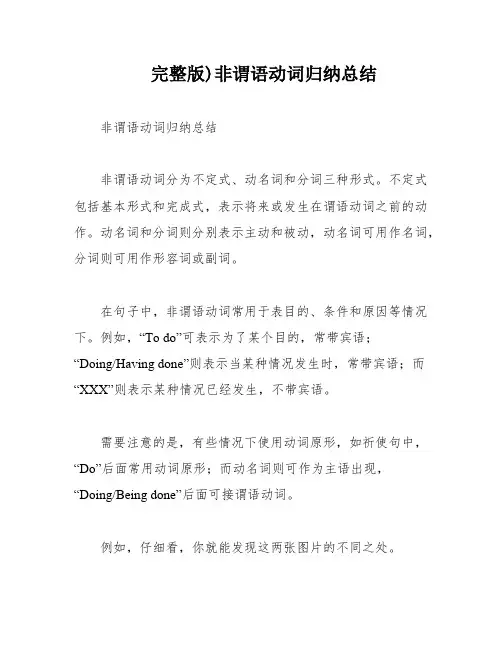
完整版)非谓语动词归纳总结非谓语动词归纳总结非谓语动词分为不定式、动名词和分词三种形式。
不定式包括基本形式和完成式,表示将来或发生在谓语动词之前的动作。
动名词和分词则分别表示主动和被动,动名词可用作名词,分词则可用作形容词或副词。
在句子中,非谓语动词常用于表目的、条件和原因等情况下。
例如,“To do”可表示为了某个目的,常带宾语;“Doing/Having done”则表示当某种情况发生时,常带宾语;而“XXX”则表示某种情况已经发生,不带宾语。
需要注意的是,有些情况下使用动词原形,如祈使句中,“Do”后面常用动词原形;而动名词则可作为主语出现,“Doing/Being done”后面可接谓语动词。
例如,仔细看,你就能发现这两张图片的不同之处。
1.Anyone who was seen carrying bags。
boxes。
or cases was XXX(作定语)2.Steam being produced XXX(作主语补足语)3.We decided to stay at home upon seeing the roads covered with snow and ice。
(作宾语补足语)4.The building that will be completed next month will be used as a XXX(作定语)5.The problem being discussed now is not the one that was XXX(作定语)6.XXX(作宾语补足语)7.XXX the air quality in Beijing。
(作目的状语)8.Don't keep the water running when you XXX(作宾语补足语)固定搭配:1.跟不定式作宾语的动词:Aim。
appear。
agree。
arrange。
decide。
choose。

高中英语:非谓语动词考点全总结!含义+用法+例题讲解,三合一教会你!非谓语动词的含义非谓语动词首先是一种动词形式,其次是这种动词形式不能做谓语,综合这两点,我们将其叫做非谓语动词。
非谓语动词的形式非谓语动词包含四种形式,即不定式、动名词、现在分词和过去分词。
其中,每种形式按照发生时间和主被动又包括不同的子形式。
具体如下:1. 不定式①基本形式:to do(表示主动,并且一般表示将来)②被动式:to be done(表示被动,并且一般表示将来)③进行式:to be doing (表示主动和进行)④完成时:to have done(表示主动和完成)⑤完成被动式:to have been done(表示被动和完成)⑥完成进行式:to have been doing (表示主动和完成进行)The teacher told us to do morning exercises. 老师让我们做早操。
The car to be bought is for his sister.要买的这辆车是给他的姐姐的。
She pretended to be reading when the teacher came into the classroom.老师进来时,她假装正在读书。
The thief is said to have escaped.据说小偷已经逃跑了。
The thief is said to have been arrested.据说小偷已经被抓住了。
She is said to have been working in the factory over the last 20 years.据说在过去的20年里,她一直在这家工厂工作。
2. 动名词①基本形式:doing (表示主动)②被动式:being done(表示被动)③完成式:having done(表示主动和完成)④完成被动式:having been done(表示被动和完成)Travelling in space by ordinary people will be common in the future.在未来,普通人在太空旅行将会是普遍的事情。
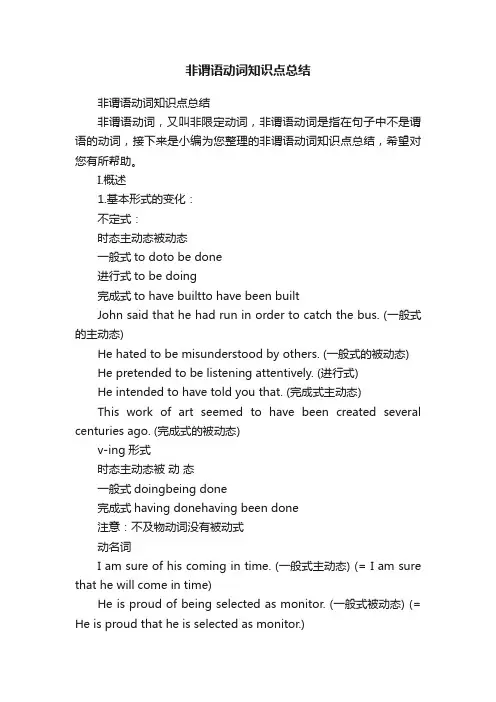
非谓语动词知识点总结非谓语动词知识点总结非谓语动词,又叫非限定动词,非谓语动词是指在句子中不是谓语的动词,接下来是小编为您整理的非谓语动词知识点总结,希望对您有所帮助。
I.概述1.基本形式的变化:不定式:时态主动态被动态一般式to doto be done进行式to be doing完成式to have builtto have been builtJohn said that he had run in order to catch the bus. (一般式的主动态)He hated to be misunderstood by others. (一般式的被动态) He pretended to be listening attentively. (进行式)He intended to have told you that. (完成式主动态)This work of art seemed to have been created several centuries ago. (完成式的被动态)v-ing形式时态主动态被动态一般式doingbeing done完成式having donehaving been done注意:不及物动词没有被动式动名词I am sure of his coming in time. (一般式主动态) (= I am sure that he will come in time)He is proud of being selected as monitor. (一般式被动态) (= He is proud that he is selected as monitor.)I’m confident of his having passed the exam. (完成式主动态) (= I am confident that he have passed the exam.)He complained of having been cheated by others. (完成式被动态)现在分词He sat in a chair,reading a novel. (一般式主动态)Being exhausted by work, he fell asleep quickly. (一般式被动态)Having finished his homework, he went playing. (完成式主动态)All this having been settled, he went home. (完成式被动态)2.所做成分项目/成分主语表语宾语宾补定语状语动词的ing形式现在分词△ △△△动名词△△△ △不定式△△△△△△过去分词△ △△△注:现在分词、不定式、过去分词都可以作独立成分。
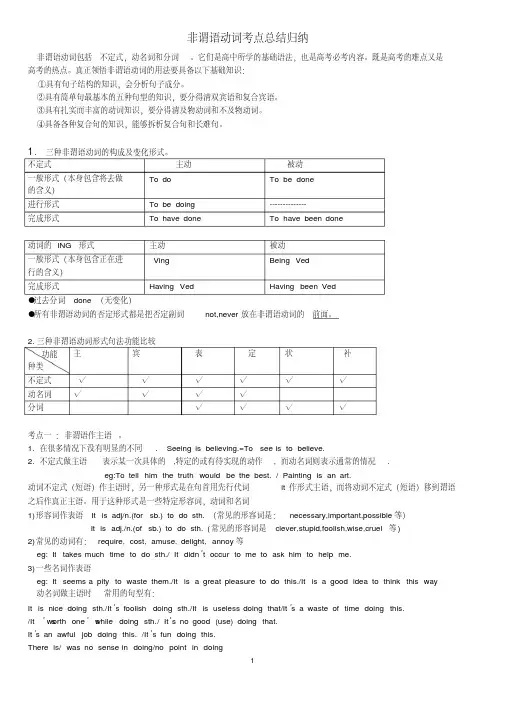
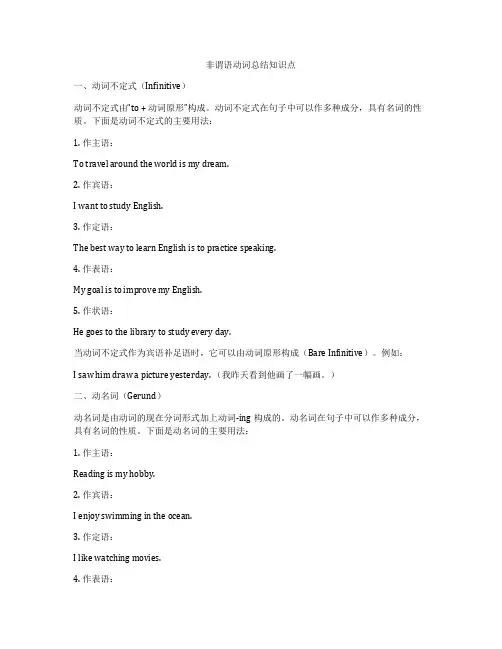
非谓语动词总结知识点一、动词不定式(Infinitive)动词不定式由“to + 动词原形”构成。
动词不定式在句子中可以作多种成分,具有名词的性质。
下面是动词不定式的主要用法:1. 作主语:To travel around the world is my dream.2. 作宾语:I want to study English.3. 作定语:The best way to learn English is to practice speaking.4. 作表语:My goal is to improve my English.5. 作状语:He goes to the library to study every day.当动词不定式作为宾语补足语时,它可以由动词原形构成(Bare Infinitive)。
例如:I saw him draw a picture yesterday. (我昨天看到他画了一幅画。
)二、动名词(Gerund)动名词是由动词的现在分词形式加上动词-ing构成的。
动名词在句子中可以作多种成分,具有名词的性质。
下面是动名词的主要用法:1. 作主语:Reading is my hobby.2. 作宾语:I enjoy swimming in the ocean.3. 作定语:I like watching movies.4. 作表语:His favorite activity is playing basketball.5. 作状语:He left without saying goodbye.动名词与不定式的区别在于,动名词具有名词的性质,而动词不定式具有动词的性质。
例如:I like swimming. (我喜欢游泳。
)I like to swim. (我喜欢游泳。
)动名词与动词不定式作宾语时,有时可以根据动词选择使用不定式还是动名词。
例如:I stopped smoking. (我戒烟了。
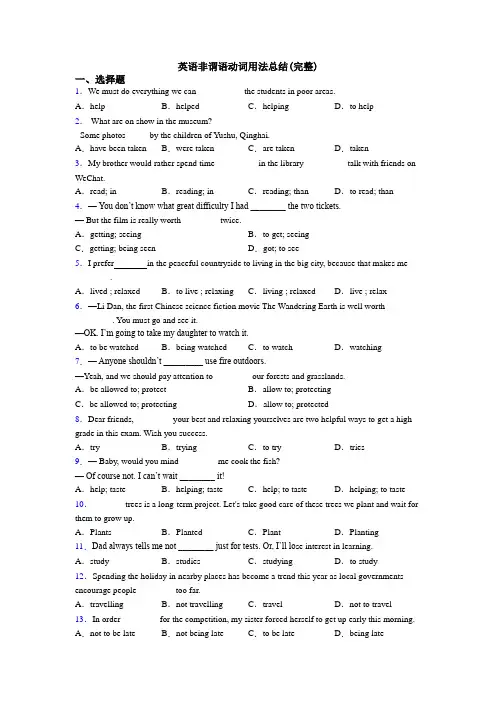
英语非谓语动词用法总结(完整)一、选择题1.We must do everything we can __________ the students in poor areas.A.help B.helped C.helping D.to help2.-What are on show in the museum?-Some photos _____by the children of Yushu, Qinghai.A.have been taken B.were taken C.are taken D.taken3.My brother would rather spend time _________ in the library _________ talk with friends on WeChat.A.read; in B.reading; in C.reading; than D.to read; than 4.—You don’t know what great difficulty I had ________ the two tickets.— But the film is really worth ________ twice.A.getting; seeing B.to get; seeingC.getting; being seen D.got; to see5.I prefer in the peaceful countryside to living in the big city, because that makes me ________.A.lived ; relaxed B.to live ; relaxing C.living ; relaxed D.live ; relax 6.—Li Dan, the first Chinese science fiction movie The Wandering Earth is well worth________ . You must go and see it.—OK. I’m going to take my daughter to watch it.A.to be watched B.being watched C.to watch D.watching 7.—Anyone shouldn’t _________ use fire outdoors.—Yeah, and we should pay attention to ________ our forests and grasslands.A.be allowed to; protect B.allow to; protectingC.be allowed to; protecting D.allow to; protected8.Dear friends, ________ your best and relaxing yourselves are two helpful ways to get a high grade in this exam. Wish you success.A.try B.trying C.to try D.tries9.— Baby, would you mind ________ me cook the fish?—Of course not. I can’t wait ________ it!A.help; taste B.helping; taste C.help; to taste D.helping; to taste 10._______ trees is a long-term project. Let's take good care of these trees we plant and wait for them to grow up.A.Plants B.Planted C.Plant D.Planting11.Dad always tells me not ________ just for tests. Or, I’ll lo se interest in learning.A.study B.studies C.studying D.to study 12.Spending the holiday in nearby places has become a trend this year as local governments encourage people ________ too far.A.travelling B.not travelling C.travel D.not to travel 13.In order ________ for the competition, my sister forced herself to get up early this morning. A.not to be late B.not being late C.to be late D.being late14.We should encourage our students _____ hard instead of ____ too much time playing games. A.work; spend B.to work; spendC.work; spending D.to work; spending15.Online short video apps like Douyin make________easier to do some shopping at home. A.it B.one C.this D.that 16.—What’s your plan for the coming summer holiday?—I’ll devote as much time as I can some v oluntary work.A.to do B.to doing C.do D.doing17.Fans all over the country are talking about ________ this football team has never won any match and ________ to do with it.A.whether; how B.why; how C.whether; what D.why; what18.-How do you feel after watching the movie Amazing, My Country?-Well, I think it is lucky for us ____________ this great country.A.to live B.to live in C.living D.living in 19.—Mother’s Day is coming. Shall we make some paper roses for Mum?—Sounds great! But would you please show me _______ as I know little about DIY? A.where B.why C.whether D.how20.Life is about waiting for the right moment ________, because everyone is in his own TIME ZONE.A.acting B.to act C.act D.acts21.More TV programs, according to government officials, will be produced _____ people’s attention over food safety.A.to raise B.raising C.to rise D.rising22.I was tired out, so I stopped the car a short rest.A.have B.having C.to have D.had23.—I don’t know _____ remember the new English words.—Don’t worry! Try thinking about their pronunciations.A.what to B.how to C.where to D.when to24.–Your robot has caught a virus and it no longer works properly.–Wow, ______ mess it has made! I really don’t know _______ to do with it.A.what, how B.how, how C.what a, what D.how, what 25.My uncle made up his mind to devote his life pollution happily.A.to prevent; to live B.to prevent; from livingC.to preventing; to live D.to preventing; from living26.___________for his good skill, this doctor has a lot of visitors calling for help all the time. A.Knowing B.To know C.Known D.To have known 27.The old couple often take a walk after supper in the park with their pet dog ___________ them.A.to follow B.following C.followed D.follows 28.Mrs. White showed her student some old maps ________from the library.A.to borrow B.to be borrowed C.borrowed D.borrowing 29.—My bike is broken.—Why not have it________?A.repair B.repaired C.repairing D.to repair 30.—Why do the students need to read every day?—________information for writing.A.To collect B.Collecting C.Collect D.Collected 31.—Mum, my computer doesn’t work. It needs_________ .—OK. I will have it _________.A.repairing; repaired B.to repair; repairC.be repaired; repairing D.being repaired; to repair32.What a terrible thing! There is a ________ dog ________ on the ground.A.die, lie B.dead, lying C.death, lay D.dying, lie 33.Seeing their teacher _______ into the classroom, they stopped _______ at once. A.walk; telling B.entering; to speak C.enter; to tell D.walking; talking 34.—What makes you so brave to volunteer in the community?—Because I know that there must be so many people __________ for our support.A.to wait B.wait C.waiting D.waited 35.With a lot of students about too much homework, our teachers have tried some ways to solve this problem.A.complain B.complaining C.complained D.to complain 36.Snakes don’t have ears but they can feel things ________.A.moving B.move C.moved D.to move37.---Is Jack in the next room ?---It’s hard to sa y. But I heard him _____ loudly when I passed by just now.A.speak B.to speak C.spoken D.speaking 38.—What are you talking about?—Some pictures ________ yesterday.A.were taken B.took C.taken D.have been taken 39.—Tom, have you ever read the book A Tale of Two Cities ________ by Charles Dickens?—Yes, I finished reading it last winter vacation.A.wrote B.to write C.writing D.written 40.When I got back home I saw a note on the door ____ “Sorry to miss you; will call later.”A.say B.says C.to say D.saying41.Look! There _______ so many people _________here. Do you know what has happened? A.is, standing B.are, are standing C.are, standing 42.Lily’s parents always encourage her ____out her opinions.A.speak B.speaking C.to speak D.spoken 43.The rubbish ________ every day is becoming a serious problem in cities around the world. A.produce B.produced C.producer D.producing44.--- Have you seen the movie《Lost in Thailand》?--- Yeah, it’s truly worth ________. It’s ________ interesting that I’ve seen it tw ice. A.seeing; too B.to see; enough C.seeing; so D.to see; such45.This food is cooked by a cook _____ Victor.A.call B.calls C.called D.calling 46.Gina is the only girl ______ a coat.A.who wear B.who wearing C.wearing D.wears47.I would rather spend time ______ at home than ______ out with you.A.staying; go B.to stay; to go C.staying; to go D.to stay; go48.—Spring is also the time when the farmers are busy _______ the wheat.—Usually they don’t stop _______ even it’s lunchtime.A.growing; working B.growing; to work C.grow, to work D.grow; working 49.People are advised to avoid ________ their eyes, nose, and mouth with unwashed hands. A.touch B.touched C.to touch D.touching 50.Paul is really considering________himself to________ those children in the earthquake-hit area.A.to devote, teaching B.devoting, teaching C.devoting, teach D.to devote, teach 51.—I prefer ________ with a pen to ________ on the computer, because I type so slowly. —So do I.A.write; typing B.to write; to type C.writing; to type D.writing; typing 52.These young trees will require ________carefully.A.to look after B.being looked after C.having looked after D. looking after 53.Huawei has succeeded in ________new software for his products. I can’t wait ________a new Huawei mobile.A.developing, to buy B.developed, buying C.developing, buy D.develop, buying 54.—How much do you know "996" schedule?—Well, it means _____________from 9 am to 9 pm, six days a week.A.working B.worked C.to work D.works 55.When you travel abroad, you can hardly avoid products made in China.A.to buy B.buy C.buying D.be bought56.A new high-speed railway ________ Yangzhou ________ Nanjing will be built. A.connected; and B.connects; with C.connected; to D.connecting; to 57.I like because it makes us know ourselves better and know more about the world. A.reading B.cooking C.swimming D.dancing58.The girl is often seen ____in the art room.A.practice drawing B.practised drawingC.to practice drawing D.practice to draw59.--Would you mind basketball here? I'm writing a report.--Sorry. We'll go and play it on the playground.A.playing B.not playing C.to play D.not to play60.If you want to make yourself ______, you should speak clearly and slowly.A.to understand B.understood C.understand D.understanding 【参考答案】一、选择题1.D解析:D【详解】句意:我们必须尽我们所能来帮助贫困地区的学生。
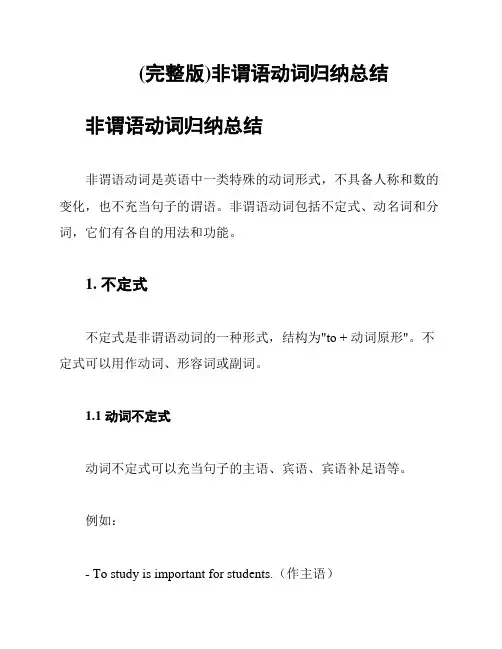
(完整版)非谓语动词归纳总结非谓语动词归纳总结非谓语动词是英语中一类特殊的动词形式,不具备人称和数的变化,也不充当句子的谓语。
非谓语动词包括不定式、动名词和分词,它们有各自的用法和功能。
1. 不定式不定式是非谓语动词的一种形式,结构为"to + 动词原形"。
不定式可以用作动词、形容词或副词。
1.1 动词不定式动词不定式可以充当句子的主语、宾语、宾语补足语等。
例如:- To study is important for students.(作主语)- I want to learn English.(作宾语)- She asked me to help her.(作宾语补足语)1.2 形容词不定式形容词不定式用于修饰名词或代词。
例如:- I have a book to read.(修饰名词)- He is the man to trust.(修饰代词)1.3 副词不定式副词不定式用于修饰动词、形容词或副词。
例如:- She worked hard to pass the exam.(修饰动词)- He is happy to see you.(修饰形容词)- She walked quickly to catch the bus.(修饰副词)2. 动名词动名词是非谓语动词的一种形式,结构为动词的现在分词形式。
动名词可以充当句子的主语、宾语、宾语补足语等。
例如:- Swimming is good exercise.(作主语)- I enjoy playing basketball.(作宾语)- She kept on talking.(作宾语补足语)3. 分词分词是非谓语动词的一种形式,根据时态和完成程度的不同,分词分为现在分词和过去分词。
3.1 现在分词现在分词用于表示主动或进行的动作。
例如:- The running boy is my brother.(作定语)- She stood there, crying.(作状语)3.2 过去分词过去分词用于表示被动或完成的动作。
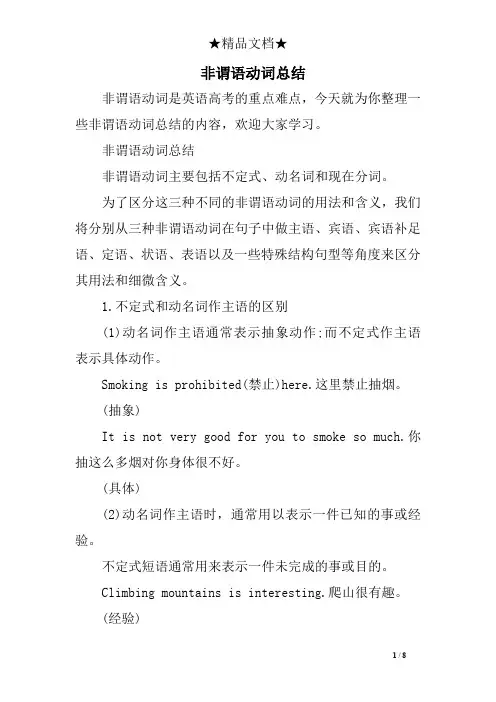
非谓语动词总结非谓语动词是英语高考的重点难点,今天就为你整理一些非谓语动词总结的内容,欢迎大家学习。
非谓语动词总结非谓语动词主要包括不定式、动名词和现在分词。
为了区分这三种不同的非谓语动词的用法和含义,我们将分别从三种非谓语动词在句子中做主语、宾语、宾语补足语、定语、状语、表语以及一些特殊结构句型等角度来区分其用法和细微含义。
1.不定式和动名词作主语的区别(1)动名词作主语通常表示抽象动作;而不定式作主语表示具体动作。
Smoking is prohibited(禁止)here.这里禁止抽烟。
(抽象)It is not very good for you to smoke so much.你抽这么多烟对你身体很不好。
(具体)(2)动名词作主语时,通常用以表示一件已知的事或经验。
不定式短语通常用来表示一件未完成的事或目的。
Climbing mountains is interesting.爬山很有趣。
(经验)Driving a car during the rush hour is tiring.在高峰时刻开车令人厌烦。
(经验)(3)不定式做主语,一般用it当形式主语,把作主语的不定式短语后置。
It took me only five minutes to finish the job.2.不定式、动名词和分词作表语的区别(1)不定式作表语1)不定式作表语一般表示具体动作,特别是表示将来的动作。
To do two things at a time is to do neither.--次做两件事等于未做。
What I would suggest is to start work at once.我的建议是立刻开始干。
(2)如果主语是不定式(表示条件),表语也是不定式(表示结果)。
To see is to believe.百闻不如一见。
To work means to earn a living.工作就是为了生活。
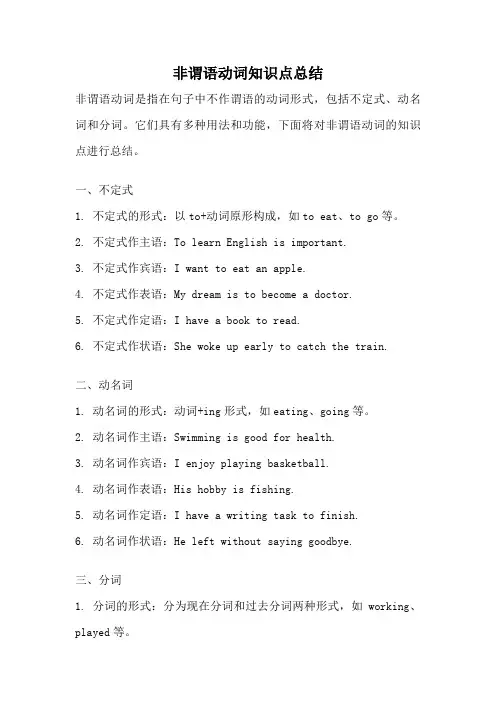
非谓语动词知识点总结非谓语动词是指在句子中不作谓语的动词形式,包括不定式、动名词和分词。
它们具有多种用法和功能,下面将对非谓语动词的知识点进行总结。
一、不定式1. 不定式的形式:以to+动词原形构成,如to eat、to go等。
2. 不定式作主语:To learn English is important.3. 不定式作宾语:I want to eat an apple.4. 不定式作表语:My dream is to become a doctor.5. 不定式作定语:I have a book to read.6. 不定式作状语:She woke up early to catch the train.二、动名词1. 动名词的形式:动词+ing形式,如eating、going等。
2. 动名词作主语:Swimming is good for health.3. 动名词作宾语:I enjoy playing basketball.4. 动名词作表语:His hobby is fishing.5. 动名词作定语:I have a writing task to finish.6. 动名词作状语:He left without saying goodbye.三、分词1. 分词的形式:分为现在分词和过去分词两种形式,如working、played等。
2. 现在分词作主语:Reading helps improve vocabulary.3. 现在分词作宾语:She heard someone calling her name.4. 现在分词作表语:He is a hardworking student.5. 现在分词作定语:I saw a running dog in the park.6. 现在分词作状语:He left the room, closing the door behind him.7. 过去分词作宾语补足语:I found the door closed.四、非谓语动词的逻辑主语1. 不定式的逻辑主语:It is important to learn English.2. 动名词的逻辑主语:Swimming helps improve health.3. 分词的逻辑主语:Reading books is beneficial for children.五、非谓语动词的否定形式1. 不定式的否定形式:not+不定式,如not to go、not to eat等。
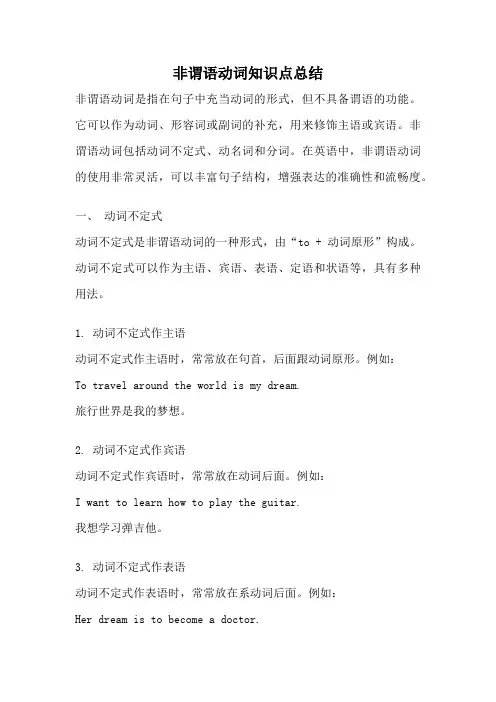
非谓语动词知识点总结非谓语动词是指在句子中充当动词的形式,但不具备谓语的功能。
它可以作为动词、形容词或副词的补充,用来修饰主语或宾语。
非谓语动词包括动词不定式、动名词和分词。
在英语中,非谓语动词的使用非常灵活,可以丰富句子结构,增强表达的准确性和流畅度。
一、动词不定式动词不定式是非谓语动词的一种形式,由“to + 动词原形”构成。
动词不定式可以作为主语、宾语、表语、定语和状语等,具有多种用法。
1. 动词不定式作主语动词不定式作主语时,常常放在句首,后面跟动词原形。
例如:To travel around the world is my dream.旅行世界是我的梦想。
2. 动词不定式作宾语动词不定式作宾语时,常常放在动词后面。
例如:I want to learn how to play the guitar.我想学习弹吉他。
3. 动词不定式作表语动词不定式作表语时,常常放在系动词后面。
例如:Her dream is to become a doctor.她的梦想是成为一名医生。
4. 动词不定式作定语动词不定式作定语时,常常放在名词前面,修饰名词。
例如:The best way to learn English is to practice every day.学习英语的最好方法是每天练习。
5. 动词不定式作状语动词不定式作状语时,常常放在句子后面,修饰整个句子。
例如:He woke up early to catch the train.他早起赶火车。
二、动名词动名词是非谓语动词的一种形式,它是动词加上-ing构成的名词。
动名词可以作主语、宾语、表语、定语和状语等,具有多种用法。
1. 动名词作主语动名词作主语时,常常放在句首。
例如:Swimming is good for your health.游泳对健康有益。
2. 动名词作宾语动名词作宾语时,常常放在动词后面。
例如:I enjoy reading books in my free time.我喜欢在空闲时间读书。
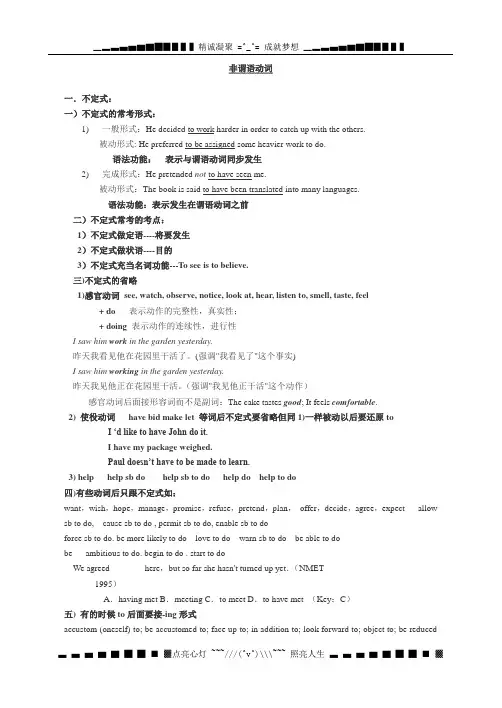
非谓语动词一.不定式:一)不定式的常考形式:1) 一般形式:He decided to work harder in order to catch up with the others.被动形式: He preferred to be assigned some heavier work to do.语法功能:表示与谓语动词同步发生2) 完成形式:He pretended not to have seen me.被动形式:The book is said to have been translated into many languages.语法功能:表示发生在谓语动词之前二)不定式常考的考点:1)不定式做定语----将要发生2)不定式做状语----目的3)不定式充当名词功能---To see is to believe.三)不定式的省略1)感官动词see, watch, observe, notice, look at, hear, listen to, smell, taste, feel+ do表示动作的完整性,真实性;+ doing表示动作的连续性,进行性I saw him work in the garden yesterday.昨天我看见他在花园里干活了。
(强调"我看见了"这个事实)I saw him working in the garden yesterday.昨天我见他正在花园里干活。
(强调"我见他正干活"这个动作)感官动词后面接形容词而不是副词:The cake tastes good; It feels comfortable.2) 使役动词have bid make let 等词后不定式要省略但同1)一样被动以后要还原toI ‘d like to have John do it.I have my package weighed.Paul doesn’t have to be made to learn.3) help help sb do help sb to do help do help to do四)有些动词后只跟不定式如:want,wish,hope,manage,promise,refuse,pretend,plan,offer,decide,agree,expect allow sb to do, cause sb to do , permit sb to do, enable sb to doforce sb to do. be more likely to do love to do warn sb to do be able to dobe ambitious to do. begin to do . start to doWe agreed _______ here,but so far she hasn't turned up yet.(NMET1995)A.having met B.meeting C.to meet D.to have met (Key:C)五) 有的时候to后面要接-ing形式accustom (oneself) to; be accustomed to; face up to; in addition to; look forward to; object to; be reducedto; resign oneself to; be resigned to; resort to; sink to; be used to; be alternative to; be close/closeness to; be dedication/dedicated to; be opposition/opposed to; be similarity/similar to.三、need/want 后的-ing形式具有被动的意思。
(详细版)非谓语动词总结要点非谓语动词总结要点一、非谓语动词的基本概念非谓语动词是指在句子中充当动词的成分,但不具备时态和人称变化。
常见的非谓语动词包括动词不定式、动名词和分词。
二、动词不定式的特点和用法1. 动词不定式的特点:不定式一般由to + 动词原形构成。
2. 动词不定式的用法:- 作主语:To travel around the world is my dream.- 作宾语:She loves to sing and dance.- 作宾语补足语:They want me to join their team.- 作状语:I study hard to improve my English.- 与某些动词连用,如hope, expect, want, agree等:I hope to see you soon.三、动名词的特点和用法1. 动名词的特点:动名词一般由动词-ing形式构成。
2. 动名词的用法:- 作主语:Swimming is good for your health.- 作宾语:I enjoy reading books.- 作宾语补足语:She found pleasure in helping others.- 作定语:The running water sounds relaxing.四、分词的特点和用法1. 分词的特点:分词形式有现在分词(-ing形式)和过去分词(-ed或其他形式)。
2. 分词的用法:- 现在分词作状语:Seeing the accident, he hurried to call an ambulance.- 过去分词作定语:The broken window needs to be repaired.五、非谓语动词的时态和语态非谓语动词没有时态和人称变化,但可以与助动词连用,表示完成、进行、将来等不同的时态。
同时,非谓语动词也可以使用被动语态。
最全的非谓语动词知识点总结非谓语动词是指动词的非动词形式,分为动词不定式、动名词和现在分词、过去分词。
下面是非谓语动词的最全知识点总结:一、动词不定式(Infinitive)1.动词不定式的形式:- 常规形式:to+动词原形(to do)- 被动形式:to be done- 完成形式:to have done2.动词不定式的用法:- 作主语:To read books is my hobby.- 作宾语:I want to go home.- 作定语:Can you give me something to eat?- 作状语:I study hard to pass the exam.3.动词不定式与一些动词搭配:- 动词make, let, have, help后接动词原形作宾语:She made me clean the room.- 动词比如tell, ask, advise, want, expect后可接动词不定式作宾语补足语:She told me to go there.二、动名词(Gerund)1.动名词的形式:- 动词原形+ing(doing)2.动名词的用法:- 作主语:Swimming is good for health.- 作宾语:I enjoy reading books.- 作表语:His job is teaching English.- 作定语:The running water sounds relaxing.- 作状语:I walked home, singing songs.3.动名词与一些动词搭配:- 动词stop, finish, keep, mind后接动名词作宾语:He finished reading the book.- 动词enjoy, dislike, mind后接动名词作宾语:I enjoy swimming.三、现在分词(Present Participle)1.现在分词的形式:- 原形+ing(doing)2.现在分词的用法:- 作定语:The crying baby needs attention.- 作状语:He left the party, feeling disappointed.3.现在分词与一些动词搭配:- 动词keep, catch, find后接现在分词作宾补:I caught him stealing my money.- 动词see, hear, notice后接现在分词作宾补:I saw him walking in the park.四、过去分词(Past Participle)1.过去分词的形式:- 动词的过去分词形式(done)2.过去分词的用法:- 用于完成时态:I have finished my homework.- 用于被动语态:The book was written by him.3.过去分词与一些动词搭配:- 动词have, has, had, get, be等后接过去分词构成完成时态:He has eaten breakfast.- 动词make, let, have, get后接过去分词构成被动语态:She was made to clean the room.。
非谓语动词总结(高考完整版)一、非谓语动词的含义非谓语动词首先是一种动词形式,其次是这种动词形式不能做谓语,综合这两点,我们将其叫做非谓语动词。
老师进来时,她假装正在读书。
④完成时:to have done(表示主动和完成)eg: The thief is said to have escaped.据说小偷已经逃跑了。
⑤完成被动式:to have been done(表示被动和完成)eg:The thief is said to have been arrested.据说小偷已经被抓住了。
⑥完成进行式:to have been doing (表示主动和完成进行)eg: She is said to have been working in the factory over the last 20 years.据说在过去的20年里,她一直在这家工厂工作。
(2)动名词①基本形式:doing (表示主动)eg: Travelling in space by ordinary people will be common in the future.在未来,普通人在太空旅行将会是普遍的事情。
②被动式:being done(表示被动)eg: Freddy and his band could go nowhere without being followed by their fans.弗雷迪和他的乐队到哪里都被他们的粉丝跟着。
③完成式:having done(表示主动和完成)eg: I have no idea of his having done such a thing against you.我不知道他做过这样一件违背你的事情。
④完成被动式:having been done(表示被动和完成)eg: Many customers complain of having been given short weight at that shop.很多顾客抱怨在那家商店被缺斤少两过。
最全的非谓语动词知识点总结非谓语动词是指动词的非时态形式,它不具备时态和人称的变化。
常见的非谓语动词包括动词不定式、动名词和分词。
下面是非谓语动词的最全知识点总结:1. 动词不定式(to-不定式):-用法:- 作主语:To travel is my dream.- 作宾语:I want to go home.- 作定语:This is a book to read.- 作状语:He studies hard to pass the exam.- 不定式的否定形式:not + 不定式- 不定式的完成形式:to have + 过去分词- 不定式的被动形式:to be + 过去分词2. 动名词(-ing 形式):-用法:- 作主语:Swimming is good exercise.- 作宾语:I enjoy reading books.- 作表语:His favorite activity is playing soccer.- 作定语:I have a writing assignment.- 作状语:She left, crying.- 动名词的否定形式:not + 动名词-动名词可以表示一些动作、状态或者习惯性的行为3.分词:- 现在分词(-ing 形式):-用法:- 作定语:The running water is cold.- 作状语:He left, whistling a tune.-合并式现在分词:在主语和系动词之间发生合并,形成一个合并式的形容词。
- The girl is crying. (合并式:The girl is crying.)- 过去分词(一般以 -ed 或 -en 结尾):-用法:- 作定语:A broken window needs to be fixed.- 作状语:I was tired, so I went to bed.-分词作定语时,与被修饰词之间具有被动、完成、被完成等被动意义。
非谓语动词用法总结非谓语动词是指在句子中不作谓语动词使用的动词形式,包括不定式、动名词和分词。
以下是它们的用法总结:1. 不定式(Infinitive):-结构:to + 动词原形-用法:-作主语:To learn a new language is challenging.-作宾语:She wants to eat lunch.-作宾语补足语:I find it difficult to understand.-作定语:The best way to learn is by doing.-作状语:She studies hard to succeed.2. 动名词(Gerund):-结构:动词的-ing形式-用法:-作主语:Swimming is my favorite sport.-作宾语:I enjoy reading books.-作宾语补足语:I consider him as my friend.-作定语:I saw a girl reading a book.-作状语:He left without saying goodbye.3. 分词(Participle):-有现在分词和过去分词两种形式。
-现在分词一般以-ing结尾,过去分词常以-ed、-en、-d、-t等结尾。
-用法:-作定语:The girl standing there is my sister. (现在分词)-作状语:Feeling tired, she decided to take a nap. (现在分词)-作宾语补足语:I saw the movie directed by Steven Spielberg. (过去分词)-与连系动词一起构成系表结构:The cake smells delicious. (现在分词)总的来说,非谓语动词在句子中可以充当多种不同的语法角色,包括主语、宾语、宾语补足语、定语和状语。
非谓语动词全总结一.非谓语动词的含义非谓语动词首先是一种动词形式,其次是这种动词形式不能做谓语,综合这两点,我们将其叫做非谓语动词。
二. 非谓语动词的形式非谓语动词包含四种形式,即不定式、动名词、现在分词和过去分词。
具体形式如下:1. 不定式:to do(表示主动,并且一般表示将来)例如:The teacher told us to do morning exercises .老师让我们做早操。
2. 动名词:doing (表示主动)例如:Travelling in space by ordinary people will be common in the future.在未来,普通人在太空旅行将会是普遍的事情。
3. 现在分词:doing (表示主动和进行)例如:He sat there,reading a newspaper.他坐在那里,读着一张报纸。
4. 过去分词:done及物动词的过去分词表示被动或完成;不及物动词的过去分词表示主动或完成。
polluted river 被污染的河流(及物动词pollute和river之间是被动关系,即“河流被污染”)fallen leaves 落叶(不及物动词fall和leaves之间是主动关系,即“叶子落下来”)注意:非谓语动词本身不能表示现在和过去。
非谓语动词表示进行和将来是相对于谓语动作来说的:和谓语动作同时发生表示进行;发生在谓语动作之后表示将来三. 非谓语动词的作用非谓语动词除去不能做谓语之外,其它所有成分都可以做。
具体如下。
1. 不定式:做主语、宾语、表语、定语、状语和补语。
To learn a foreign language is difficult .(作主语)学会一门外语是很难的。
It’s easy to see their aunt.(作真正主语,it做形式主语)很容易见到他们的姑姑。
Tom wanted to have a cup of beer.(作宾语)汤姆想要喝杯啤酒。
定义及构成功能及用法注意事项would rather句式非谓语动词重要句式归纳定义及构成功能及用法注意事项would rather句式非谓语动词重要句式归纳展开编辑本段定义及构成非谓语动词与谓语动词的相同点有(1)如果是及物动词都可与宾语连用,例如:They built a garden.They suggested building a garden.(2)都可以被状语修饰:The suit fits him very well.The suit used to fit him very well.(3)都有主动与被动, “体”式(一般式;进行式;完成式)的变化。
例如:He was punished by his parents.(谓语动词被动语态)He avoided being punished by his parents.(动名词的被动式)We have written the composition.(谓语动词的完成时)Having written the composition, we handed it in.(现在分词的完成式)(4)都可以有逻辑主语(1)一般式:不定式的一般式所表示的动作与谓语动词动作同时发生或发生在谓语动词动作之后.例如:I'm glad to meet you. 很高兴见到你。
He seems to know a lot. 他看起来懂得很多。
We plan to pay a visit. 我们计划花钱去参观。
He wants to be an artist. 他想成为一个艺术家。
The patient asked to be operated on at once. 病人要求马上手术。
The teacher ordered the work to be done. 老师要求完成工作。
(2)进行式:不定式的进行式所表示的动作与谓语动词动作同时发生,例如:The boy pretended to be working hard. 男孩假装工作得很努力。
He seems to be reading in his room. 看起来他正在他的房间里面读书。
(3)完成式:不定式的完成式表示的动作发生在谓语动词动作之前,例如:I regretted having told a lie. 我后悔我说谎了。
I happened to have seen the film. 我偶然看过这部电影。
He is pleased to have met his friend. 他很高兴能遇上他的朋友。
不定式的句法功能:(1)作主语:To finish the work in ten minutes is very hard. 十分钟之内完成这项工作是很难的。
To lose your heart means failure. 灰心意味着失败。
动词不定式短语作主语时,常用it作形式主语,真正的主语不定式置于句后,例如上面两句可用如下形式:It is very hard to finish the work in ten minutes. 十分钟之内完成这项工作是很难的。
It means failure to lose your heart. 灰心意味着失败。
常用句式有:1、It+be+名词+to do。
2、It takes sb.+some time+to do。
3、It+be+形容词+of sb +to do。
常用careless,,clever,good,foolish,honest,kind,lazy,nice,right,silly, stupid,wise,等表示赞扬或批评的形容词,不定式前的sb.可作其逻辑主语。
(2)作表语:Her job is to clean the hall. 她的工作是打扫大厅。
He appears to have caught a cold. 他似乎感冒了。
(3)作宾语:常与不定式做宾语连用的动词有:want, hope, wish, offer, fail, plan, learn, pretend, refuse, manage, help, agree, promise, prefer, 如果不定式(宾语)后面有宾语补足语,则用it作形式宾语,真正的宾语(不定式)后置,放在宾语补足语后面,例如:Marx found it important to study the situation in Russia. 马克思发现研究俄国的情况是很重要的。
动词不定式也可充当介词宾语,如:I have no choice but to stay here. 我只能留在这里,别无选择。
He did nothing last Sunday but repair his bike. 他上周日除了修他的自行车什么也没干。
动词不定式前有时可与疑问词连用,如:He gave us some advice on how to learn English. 他给了我们一些学英语的建议。
(4)作宾语补足语:在复合宾语中,动词不定式可充当宾语补足语,如下动词常跟这种复合宾语:want, wish, ask, tell, order, beg, permit, help, advise, persuade, allow, prepare, cause, force, call on, wait for, invite.此外,介词有时也与这种复合宾语连用,如:With a lot of work to do, he didn't go to the cinema.他有很多工作要做,所以没去电影院。
有些动词如make, let, see, watch, hear, feel, have等与不带有to的不定式连用,但改为被动语态时,不定式要加to, 如:I saw him cross the road. 我看见他横过公路。
He was seen to cross the road. 他被我看见横过公路。
(5)作定语:动词不定式作定语,放在所修饰的名词或代词后。
与所修饰名词有如下关系:①动宾关系:I have a meeting to attend. 我有一个会议要出席。
注意:不定式为不及物动词时,所修饰的名词如果是地点、工具等,应有必要的介词,如:He found a good house to live in. 他找到了一个居住的好房子。
The child has nothing to worry about. 这个孩子无忧无虑。
What did you open it with? 你用什么打开它?如果不定式修饰time, place, way,可以省略介词:He has no place to live. 他无处安身。
This is the best way to work out this problem. 这是解决这个问题的最好办法。
如果不定式所修饰名词是不定式动作承受者,不定式可用主动式也可用被动式:Have you got anything to send? 你要送什么东西吗?Have you got anything to be sent? 你有什么东西需要送吗?②说明所修饰名词的内容:We have made a plan to finish the work. 我们制定了一个完成工作的计划。
③被修饰名词是不定式逻辑主语:He is the first to get here. 他第一个来到这儿。
(6)作状语:①表目的:He worked day and night to get the money. 他夜以继日地工作来赚钱。
She sold her hair to buy the watch chain. 她卖掉了自己的头发来买那条表链。
注意不定式放句首时,逻辑主语与句子主语要一致:wrong:To save money, every means has been tried.right:To save money, he has tried every means. 为了省钱,他使出了浑身解数。
wrong:To learn English well, a dictionary is needed.right:To learn English well, he needs a dictionary. 为了学好英语,他需要一本词典。
②表结果(往往是与预期愿望相反的结果意料之外):常放在never only后He arrived late only to find the train had gone. 他来晚了,只见火车已经走了。
I visited him only to find him out. 我去拜访他,只见他出去了。
③表原因:常放在形容词后面They were very sad to hear the news. 他们听到这条新闻非常伤心。
④表程度:It's too dark for us to see anything. 太暗了,我们什么也看不见。
The question is simple for him to answer. 这问题由他来回答是很简单的。
(7)作目的状语:既可以放在句首,也可以放在句尾他不懂英语给他带来许多麻烦。
动名词的句法功能:(1)作主语:Reading aloud is very helpful. 朗读是很有好处的。
Collecting stamps is interesting. 集邮很有趣。
当动名词短语作主语时常用it作形式主语。
It's no use quarrelling.争吵是没用的。
(2)作表语:In the ant city, the queen's job is laying eggs.在蚂蚁王国,蚁后的工作是产卵。
(3)作宾语:They haven't finished building the dam. 他们还没有建好大坝。
We have to prevent the air from being polluted.我们必须阻止空气被污染。
注意动名词既可作动词宾语也可作介词宾语,如上面两个例句。
此外,动名词作宾语时,若跟有宾语补足语,则常用形式宾语it,例如:We found it no good making fun of others. 我们发现取笑他人不好。
要记住如下动词及短语只跟动名词作宾语:enjoy, finish, suggest, avoid(避免), excuse ,delay, imagine, keep, miss, consider, admit(承认),deny(否认), mind, permit, forbid, practise, risk(冒险), appreciate(感激), be busy, be worth, feel like, can't stand, can't help(情不自禁地), think of, dream of, be fond of, prevent…(from),keep …from, stop…(from),protect…f rom, set about, be engaged in, spend…(in), succeed in, be used to, look forward to, object to, pay attention to, insist on, feel like (4)作定语:He can't walk without a walking-stick. 他没有拐杖不能走路。